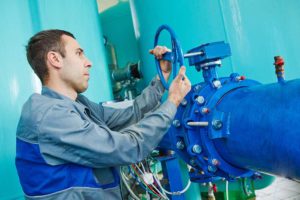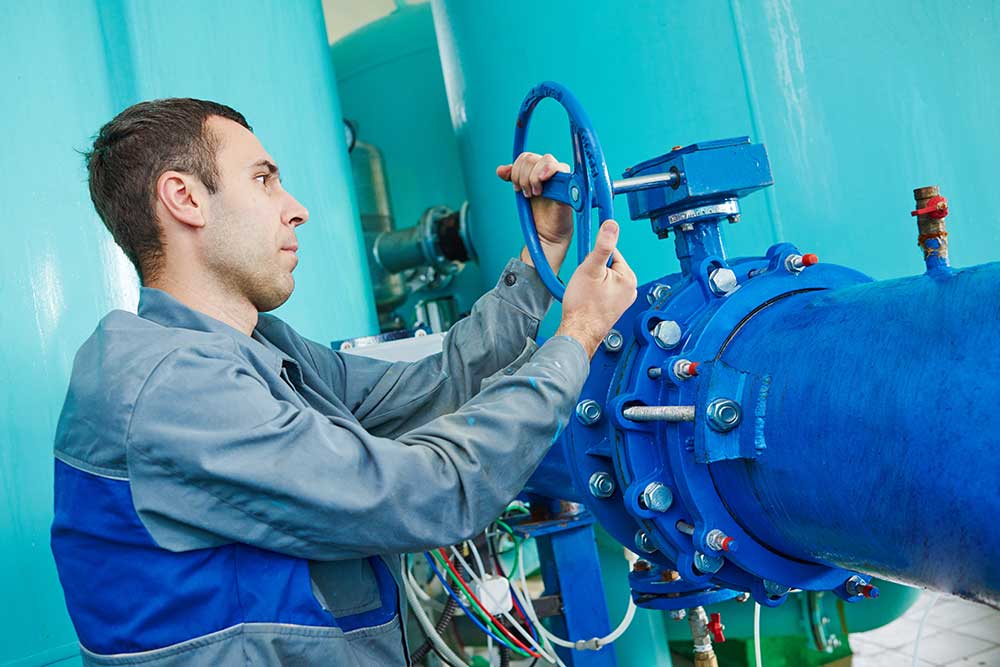Disclaimer: The information on our website is provided for general information purposes only. We make no representations or warranties of any kind, express or implied, about the completeness, accuracy, reliability, suitability or availability with respect to the website or the information contained on our website for any purpose. Any reliance on such information is therefore strictly at your own risk and we are not liable for any damages or losses arising out of or resulting from your reliance on any information contained on our website.
A water treatment operator manages a system of machines to transfer or treat water or wastewater. They monitor meters, operating conditions, and gauges through the use of control boards. They also document and track data from the gauge and meter readings. Watch a video to learn what a water treatment operator does:
How to Become a Water Treatment Plant System Operator

Many employers prefer candidates who hold an associate’s degree in a related field. Degree examples are wastewater treatment technology or environmental sciences. These programs can be found at trade associations, technical schools, and community colleges.
Some employers may accept a high school diploma or the equivalent to become operators by providing on-the-job under the supervision of an experienced operator. However, in order for a water treatment plant and system operator to become fully qualified, they are required to complete long-term on-the-job training and gain all the necessary skills needed in this occupation. Larger treatment plants typically combine formal classroom or self-paced study programs with on-the-job training.
Water treatment operators require a license in the state they reside in. These licenses have different levels indicating one’s level of training and experience. It varies by state, therefore we encourage you to look for your state requirements prior to pursuing training.
In addition, the American Water Works Association has developed minimum voluntary standards in regards to requirements, equipment, materials, and practices used in the water treatment supply field. AWWA addresses all facets of water treatment and delivery methods. They offer annual conferences, webinars, online courses, training videos, and a variety of resources. All of which can be valuable information for those entering the field or advancing one’s knowledge once becoming a Water Treatment Plant Systems Operator.
Job Description of a Water Treatment Plant System Operator
Specific duties of plant operators depend on the size and type of plant one works in. However, they typically have the job of adding chemicals to disinfect water or other liquids. They must regularly inspect equipment and monitor operating conditions, gauges, and meters. They collect and test sewage and water samples in addition to them keeping records of readings or operational data. He or she operates equipment that purifies water or to dispose of or process sewage.
A water treatment operator has the duties of cleaning and maintaining equipment, filter beds, tanks, and other work areas. They must follow U.S. Environmental Protection Agency (EPA) regulations and ensure safety standards are met. Since water plants are open 24-7, these worker’s schedules vary. Some work weekends, nights, and holidays whereas others may only work during the week. This occupation can be physically demanding and conditions can be dangerous at times. Water treatment plant operators work both indoors and outdoors.
Water Treatment Operator Career Video Transcript
People rely on ample supplies of clean water for survival, and on the proper treatment of wastewater to keep cities healthy and water sources unpolluted. Water and wastewater treatment plant and system operators manage the vital systems that treat water and wastewater. Water treatment plant and system operators oversee the treatment and distribution of freshwater, as it is pumped from wells, rivers, or reservoirs to water treatment plants. They monitor and maintain the equipment and control the processes that treat water to make it safe to drink.
Wastewater treatment plant and system operators run systems that remove pollutants from domestic and industrial waste from sewer pipe to treatment plants until it is returned to streams and oceans or is used for irrigation. Most operators work for local governments, while some work for utilities. Water and wastewater treatment plant and system operators work in conditions that are at times noisy and odorous.
Slippery walkways, dangerous gases, and the potential of equipment to malfunction present significant hazards. They must prepare for emergencies and are well versed in the use of safety practices and equipment. Most work full-time and maybe on-call or work shifts around the clock to maintain operations, especially during emergencies. High school education and licensure are required; related coursework or an associate’s degree may be helpful. Long-term on the job training is typical.
Article Citations
Bureau of Labor Statistics, U.S. Department of Labor, Occupational Outlook Handbook, Water and Wastewater Treatment Plant and System Operators.
National Center for O*NET Development. 51-8031.00. O*NET OnLine.
The career video is in the public domain from the U. S. Department of Labor, Employment and Training Administration.


